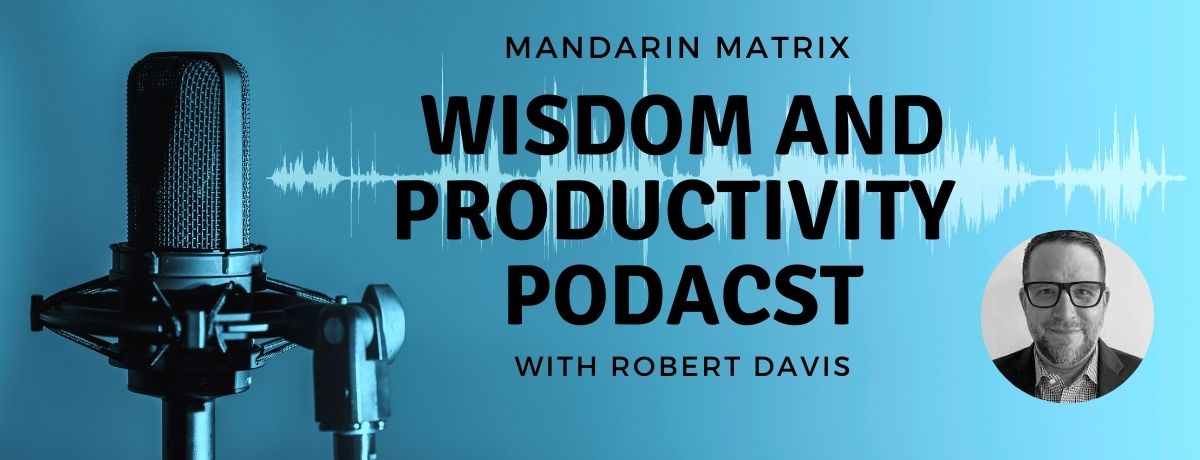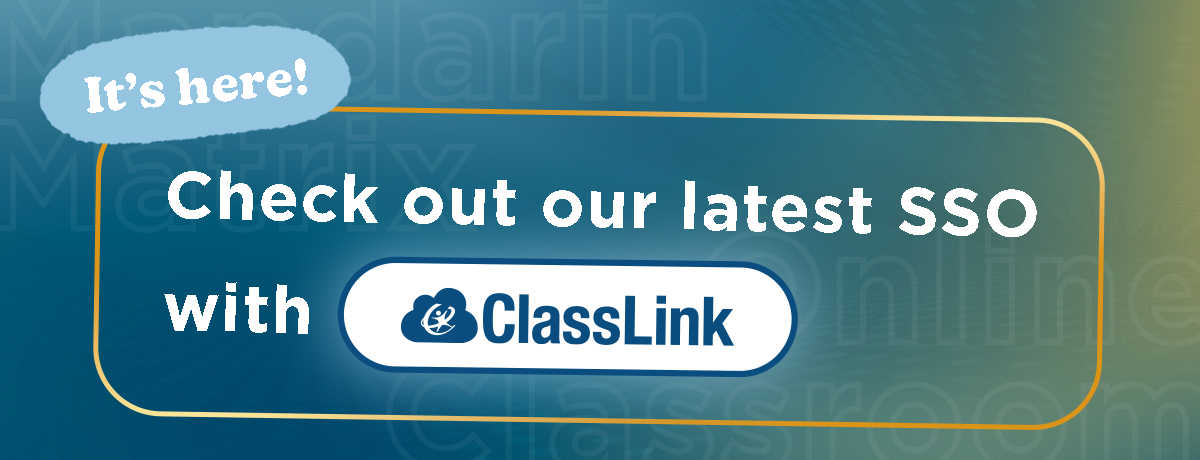Last month, Mandarin Matrix’s CEO Robert Davis sat down with Dr. Efrain Martinez on the ‘Wisdom & Productivity’ podcast to discuss Robert’s work in education and with China, as well his top productivity tips.
Dr. Efrain Martinez is the principal at Northwood Middle School in Woodstock, Illinois, and the man behind the US-based podcast ‘Wisdom & Productivity’. Having worked in the education industry for over 20 years, he started this podcast with the goal to seek wisdom and deliberate over productivity as a means of better serving his community.
Last month’s guest was our very own Robert Davis. As the Global CEO of Mandarin Matrix and former leader behind the Chinese Language and Culture Initiative at The College Board, Robert has played instrumental roles in the design and implementation of ground-breaking, internationally focused K-12 education initiatives in the US and abroad. His long career in education was initially sparked by an interest in Chinese, and to this day he remains extremely passionate about providing equitable access to academic opportunities.
Here’s what Robert had to say.
Today I have the distinguished honor of interviewing Robert Davis, Global Chief Executive Officer of Mandarin Matrix. Robert, for the listeners of this show, can you walk us through your interesting professional trajectory up to this point?
My life and career has been very unorthodox. I am a lifelong educator, and while I don’t recommend this path I will tell you that I have never to this day taken a course in education. I had been a student and I have worked in institutes of education but I’m not formally trained in it. This is a very Chicago thing in some ways, learning on the streets and learning through growing up. I grew up in a family where my father was a journalist at the Chicago Tribune, and he covered Chicago politics his entire career, so I grew up with a background of understanding city politics and the way things happen in Chicago. I went to Northern Illinois University to major in Art History focusing on China. It was there where everything really changed. I had some great teachers who encouraged me to learn Chinese, which I did, and I graduated and found myself in 1997 in Xi’an China.
I became a teacher at the Xi’an International Studies University. It was probably the single most transformative experience of my life, moving to China in the ’90s. I did not know a single person there, I barely spoke the language, and it really just changed me in so many wonderful and positive ways.
In 1999, I came back to the US and wanted to teach Chinese so I approached the Chicago Public Schools and I said “My Chinese is good enough to do level 1 or level 2 Chinese.” However at that time the Chicago Public Schools did not teach Chinese, so I was really confused because I had just come back from China where things were just like blossoming and blooming and there was this renaissance happening. So I looked into my Chicago playbook and I called the superintendent Paul Vallas, and I requested to meet with him and he agreed. I said “Paul, this is crazy, I don’t understand. I just came back from China, it’s like the future. Why aren’t we teaching Chinese? If you’re not doing it now you will be doing it later.” He said you’re hired and gave me six months to get this thing started.
We started with just three schools and that Chinese program, called the Chinese World Language Program, proved to be the largest Chinese program in the United States in any school district. This was in part due to the great help of Richard M. Daley. When you work in language and culture you went to all the community events. I attended an Asian heritage event and I saw the then-mayor of Chicago Richard M. Daley. I approached him and said I just wanted to say “hi, I know you knew my father.” And he said “your father was great, he was very kind to me, and he took the time to talk to me.” The conversation eventually led him to ask me what my job was so I said I work for you in the Chicago Public schools and I run your Chinese program. Then he replied “you gotta be kidding me! I keep asking people who does this, do you have a card?” So I gave him my card and the next day I got a call from city hall saying the mayor wants you to come in to talk. I walked to city hall scared as can be sat in the mayor’s office. He told me his brother Bill Daley, was the secretary of commerce, “My brother Billy keeps saying that China is the future, we really need to connect to China, what do you think we should do?” I answered “Mayor, I think we/you should go to China,” and he said to set it up.
From that point, I started working a strange career where I was at Chicago Public Schools but I was also working with Mayor Daley. We went to China together eight times, he was a big supporter of the work, speaking publicly about it on multiple occasions. What was interesting about this was that the community that we were working with was not what we would think a Chinese program would start with. The Chicago Public schools had and continue to have these really diverse populations of students who all are coming into the school as multilingual and multicultural students learning another language, so they are really global citizens. I know I’ve tangented a little bit but it’s important to insist because that’s what changed my perspective on how you can do things. Be creative, be excited, take risks and chances and then people respond to that and you can get things done. I did that job for over a decade and then when the mayor retired I decided to look around and do different things. At that time I was approached by the president of the College Board, former president Governor Gaston Caperton who invited me to come to the College Board to run their partnership with China, the largest US-China education partnership. I had the great honor and pleasure of working there for a decade, built an amazing team whom I consider family and friends and still talk with all the time.
Now I’ve been given the wonderful opportunity to be the global CEO of Mandarin Matrix, which is a product and organization that I was very familiar with beforehand. I’m very fond of it. We really focus on dual language immersion which I believe is very strong. I’m just getting started here, getting to know people, in the middle of the pandemic. My office is in Hong Kong. I’ve never been there. I’m working from home but I can’t wait to get on a plane and go see them and spend some real human time with them as soon as I can. I also can’t wait to get back into a classroom and see what’s going on structurally to learn about how the students and teachers are using the product and what they like and dislike about it. A really fun ride and I’m just excited about what comes next.
Do you remember when you first started learning if it was an immediate attraction and love for Mandarin? Or initially were you hesitant while learning it?
It was my second to last semester of college when I showed up to Chinese 101. I was the only non-Chinese person in the class. All these kids were from China and they were in there because they needed to get a language credit. My teacher was professor XiaoXiao Chuan, who is on my list of mentors as well. So I had this ideal situation when you think about it from a learning perspective – a dedicated teacher and a whole classroom of native speakers who were just there willing to help me. I liked it because I thought it was exciting. I had studied Spanish beforehand and I liked that as well but there was something about Chinese that just clicked for me. What always has been hard for me about romance languages is verb conjugation and all that kind of stuff. Chinese has other complicated stuff but it was exciting and it was connected to what I was studying academically – Chinese art history. I think when you have that connection and you see it coming to life it’s just a much better environment for you to dig in and really get into it.
Robert, who do you learn from?
Hopefully everybody, right? I think it’s a decision, you have to be open to it. Daily I learn from my children, from my colleagues, my wife, from my mentors I still keep in touch with.
In terms of my actual field that I mentioned, I learned so much from Armando Almendarez (Deputy Chief Education Officer of the Chicago Public Schools). He was a smart leader who took good care of his people. Part of that was insisting that people have a life. I remember him walking into the office at 5pm and saying work is over. Not because he didn’t want to stay but because he wanted us to be balanced. He also thought that we should get our work done during our work hours, focusing on doing it better. There was this kind of gentle but direct approach with this. Whenever he had the opportunity for any office member to go to a concert or anything cultural he’d give it to us. He wanted us to enjoy living in a multicultural city and celebrate it, celebrating each other’s cultures. While I was there, he sent me to Mexico for a trip and it was just amazing just to see it. It was just a really different time and I think that he just took the time to be a great leader. So I learned from him now still, even though I don’t even interact with him because I look back, and in a way I think of my father. I look back at lessons I learned from my father and they mean something different as you get older and go through your life and your career.
Additionally my colleagues – I’m so impressed and love working with them and at all my jobs there have always been a few that made me think differently about things, see that I should be less rigid and that there was multiple ways to get things done. I really do try to pay attention and now that I’m a leader I try to give my team and my colleagues a space to be successful and to fit in. I think there’s such lessons in both of those aspects.
Lastly, I would say, if you work in education, like us, I think one of the greatest ways to learn is spending time with students and teachers and that’s where I really kind of get it. You can have the greatest plans and brands whatever it is, and if it’s not working it’s not working. Teachers and students will tell you why, very directly and they will be right. So I found that if you really want to understand if you are a success, it’s not to look at your colleagues, it’s actually going to that classroom and see how it’s going. And if it’s not working there it’s not working period. What I miss most about being in the district was the possibility of going into schools quite often, even with the College Board I traveled quite a bit. With Covid it’s a little bit more difficult because they want to limit the amount of people in the building and rightfully so. However, I’m really looking forward to getting back and just being in that atmosphere but also just paying attention to see if the programs that I am overseeing now and the products are working or not.
Who are your biggest influences?
It’s going to be my parents, I’ve been so lucky to have such wonderful parents, my mother who is still alive and I see her all the time. They just made me who I am at such a foundational level. My wife, for sure, I just think she is much smarter than I am and is a better person, the best person I have ever met and she just does things with such grace and genuineness that I learn from watching her every day.
There was a professor in Uni, Dr. Richard Cooler, he was my art history professor that just took me under his wing. Seeing that I was interested and could do more, he gave me research projects at a very young age and then hired me as his research assistant and then he had me write a thesis as an undergraduate. Pushing me in ways that I wanted and he could see that. He was the person that told me to pick a major language and learn it and told me that Chinese is probably what I should learn. A lot more opportunities lie in China and literature, so I’m really glad that for that moment he said “I believe in you, you can do this.” It just changed the whole path of my life. XiaoXiao Chuan my Chinese teacher, he was the one who told me to move to China and introduced me to his university and got me my first job and led me to move there.
Richard M. Daley just adore the man, he scared me in a way that made me more productive, positive and real. He taught me things that he probably didn’t even know. When his wife would walk into the room his whole world would stop and it was all about her. We could be with the president of China and he would just stop and greet her. I learned something just from watching, that you can be at a high level position with all eyes on you but you can still be yourself at all times and that was a big takeaway for me.
At the College Board there was a wonderful man named Jim Montoya who immediately took me under his wing, just a fantastic educator. He’s been in admissions his whole life, he just had a really interesting path himself. He lived in Idaho. Latino, got himself into Stanford and worked really hard but always had time for everybody. I would call him when I was stressed out or nervous and we would talk for like half an hour, and then he’d say he should probably get back to bed and he’d be like in France and it’d be 3 am but he’d take the call. I appreciate him and still consider him a great friend.
The last thing I will say is China, this is a really broad one but, I’ve been to China 98 times. I’ve learned there for years. It’s just such a big part of me, it challenged me in ways I never knew but I also think the experience of being a foreigner, being an outsider being a minority is something that most white Americans don’t ever have a chance to have, or normally even welcome. It has influenced so much in my life and being able to be a little empathetic and patient and understand the challenges of moving. I have worked with guest teachers coming from China for two decades but just having that perspective really really helped. I’m so grateful to all these people and places and also hope I can do this for just one person alone and that would be such a joy.
Being successful must include staying on top of our productivity but these can mean so many different things for so many different people. How would you describe your productivity system?
That’s a good question, it’s pretty basic, I pray to the church of lists. I don’t always make good or smart lists. I would email a list of things I want to remember the next day, or jot it down, sometimes I even wake up in the middle of the night and write something down. I do think that I get a little scatterbrained without things written down and I feel successful when I can cross things off and I can prioritize. That’s very basic but it works for me. I think the other thing that I really and firmly believe is that I include stakeholders in every step of the way. If I’m doing things that will impact other people or making decisions that will impact others I very much like to include said people. I think that otherwise you’re guessing and that’s arrogant and I don’t want to be arrogant.
Also including stakeholders in decision making will lead them to become invested as well and they will contribute more. It could be anything from the community or staffing decisions. I have my team members interview other people because I want it to be a team. I want people to care about each other and feel comfortable to say no.
Giving yourself time to step away a little bit is also something very important. I play basketball. It’s a hoop I “put in for the kids” which I use every day. I find that since my schedule is strange since my office is in Hong Kong, I do a lot of night meetings, etc. I feel that it’s good for me otherwise I just sit in front of the computer every day. It’s also a space where I get a lot of clarity, understanding what I need to get done for the day and it’s really been great from me.
Contrary to that, I think in general I give myself space to not be working, and I think that’s really important. Don’t alway be working, because that means you won’t get your best work done. Save your energy, be creative, have fun and be present with your other activities that you do and that will give you a great foundation and the energy for you to do your job well.
Finally, I struggle with this, but insist on it, we have to build in time for failure. If we’re building new processes or products or programs we need to understand that in that process we will fail along the way, we need to put time in that to not be behind but at the same time not be defeated. Nothing works perfectly the first time out, so knowing that will be the case can help us learn from those experiences and put time for that. Starting earlier and having longer process timelines and making sure that your team understands why. Clearly expressing that failure is not a deficit but it’s part of the path. If we all do that together we’re all gonna learn from the mistake and not do it again in the future. Those are the only things I have, I wish I had something more interesting but it’s worked for me so far.
Thanks for answering and for this great conversation! I love asking that question because everybody has their productivity system and people like me can see people they admire and understand that’s how they do it. Is there anything you’d like to add for the listeners of the show?
I would, I just want to say I could do a few shout outs, let’s shout out to the language learners. You are magnificent and you are doing something really special that’s going to make a huge difference to you, your family, your community, and to the world. The teachers too! The teachers who are just the warriors out there. It’s really worth doing and there will be a moment where it will click and you will be a person of the world, you can go places and be whoever you want to be. The other thing is if you have the opportunity please travel, get out there, make yourself uncomfortable, eat the food, meet people, get on the street and you’re going to find that the world is really quite similar and people are excited to meet you and you’re excited to meet them.
Lastly, I’d just tell students that it’s a really hard time right now and you are going to be the most resilient and interesting generation that we have ever seen and I could not be more excited for your future. You’re going to get through this and we are too and you’re going to have skills that no one has had before because of it and you are going to be such a magnificent group of people. You already are but you are going to be more magnificent than we’ve ever seen before. Yes, today is hard, it’s been rough times and weird, but you got this and the future is going to be so special for all of you. I could not be more thrilled and I cheer you all on.
We hope you enjoyed this transcribed version of the Wisdom & Productivity podcast! If you’d like to listen to the audio in its entirety, you can find the full version here. Happy listening!
[Editor’s note: This interview has been edited and condensed for clarity]
More about Robert Davis
Robert Davis has greatly impacted the Chinese learning industry in the United States. He established the Chinese World Language Program in Chicago Public Schools in 1999. This grew to become the largest district-level Chinese program in the USA. He then served as Executive Director of the Chinese Language and Culture Initiative at the College Board for a decade. He is a values driven leader who helps organizations to fulfill their mission. Joining Mandarin Matrix in April 2021, he has been working with our team to constantly help and improve our products for the benefit of all our students learning Mandarin as a foreign language.






